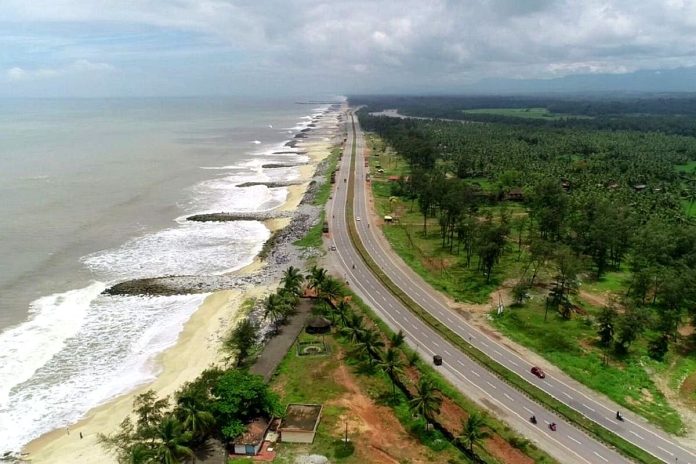Once completed, this undersea tunnel will be India’s first tunnel under a deep shipping channel, serving as a crucial link for seamless transportation along the proposed coastal highway.
Informal discussions with tunnel construction experts estimate the total cost to be around Rs 1,500 crore.
The Kerala government has initiated a significant project to construct a coastal highway spanning from Thiruvananthapuram to Kasargod, covering a distance of approximately 623 km.
The 623km project runs from Pozhiyoor in Thiruvananthapuram to Thalapady in Kasaragod, traversing nine coastal districts. The nine districts are – Thiruvananthapuram, Kollam, Alappuzha, Ernakulam, Thrissur, Malappuram, Kozhikode and Kannur.
The estimated cost of this project is Rs 6,500 crore. The highway will run parallel to the Arabian coast.
About 468 km of the project will be built by the Kerala Road Fund Board’s project management unit (KRFB-PMU), and the remaining work will be completed by the National Highways Authority of India (NHAI) as part of the Bharat Mala Pariyojana Scheme.
While 470 km of the new road would need to be constructed, 155 km of that distance will be combined with sections of NH-66 and other portions that pass near the ocean. By 2026, the project is anticipated to be finished.
Construction challenge
As the proposed highway approaches Kochi, it encounters the challenge of passing through the deep shipping channel of Kochi Port.
On the southern side of the port’s approach channel lies Fort Kochi, representing the prosperous face of the Kochi metropolis. On the other hand, to the north of Fort Kochi is the 27 km-long Vypeen Island, characterised by its underdeveloped, densely populated, and less prosperous rural landscape.
Bridging the gap between Fort Kochi and Vypeen Island poses a challenge.
Undersea Tunnel?
One potential solution is the construction of an undersea tunnel connecting the two.
Jose Paul, a former acting chairman of the Jawaharlal Nehru Port Trust in Mumbai who formerly served as head of the Mormugao Port Trust, proposed the two-kilometre underwater tunnel connecting Vypeen and Fort Kochi in 2015, shortly after the Fort Kochi boat catastrophe that lost the lives of 11 people.
He had proposed that the tunnel, which could be constructed about 35 metres below the seabed, start about 800 metres from either shore.
The construction of an undersea tunnel between Fort Kochi and Vypeen Island appears to be a feasible proposition, according to The Hindu report.
While the shipping channel between Fort Kochi and Vypeen Island has a width of only 260 m, it is essential to ensure a comfortable gradient for heavy trucks and container trailers to pass through the tunnel smoothly.
Consequently, the approach road to the tunnel will require approximately 800 m on either side, as the tunnel itself will be built approximately 35 m below the seabed. As a result, the total length of the tunnel is estimated to be around 2.6 km.
Modern tunnels are designed with separate corridors for vehicles, cyclists, and pedestrians to ensure smooth traffic flow.
The proposed tunnel, starting from Puthuvypeen and emerging at Fort Kochi Beach, could be an engineering marvel with minimal land acquisition requirements.
Informal discussions with tunnel construction experts estimate the total cost to be around Rs 1,500 crore.
Once completed, this undersea tunnel will be India’s first tunnel under a deep shipping channel, serving as a crucial link for seamless transportation along the proposed coastal highway.
It will alleviate traffic congestion, provide an efficient alternative to the national transportation network, and facilitate the transportation of people and goods across Kerala through the shortest route, saving time, energy, and fuel.
Additionally, the undersea tunnel has the potential to become a tourist attraction, and toll charges can generate immediate revenue for the government. Enhanced toll charges can be implemented to ensure a faster, safer, and well-organised transport system.
The responsibility of meeting the cost of the proposed undersea tunnel, which will eventually become an integral part of the coastal highway network, lies with the Central government as it passes through the territory of the Cochin Port Authority.
With a lifespan of approximately 100 years or more, the construction of this tunnel should be viewed as a social overhead capital that benefits both urban and rural populations. It will be a national asset and an effective alternative mode of transportation within city limits.


